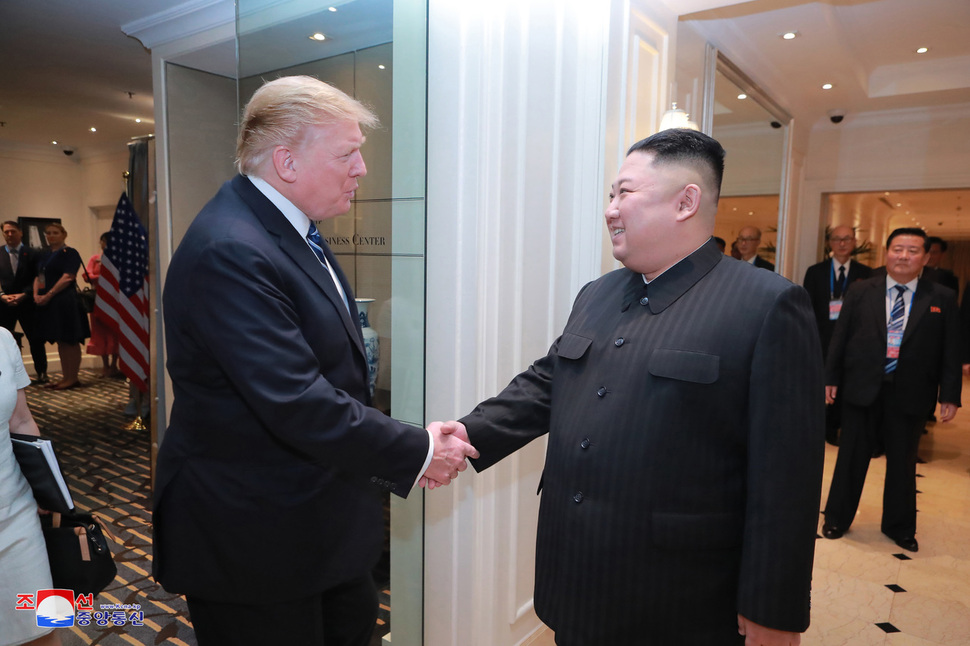 |
|
The Korean Central News Agency (KCNA) reported on the summit between North Korean leader Kim Jong-un and US President Donald Trump on Mar. 1, the day after the Hanoi summit concluded. (KCNA/Yonhap News)
|
Further provocation by N. Korea would be catastrophic to negotiations
Since the second North Korea-US summit ended in a collapse, the international community has been on alert over activities at North Korea’s long-range missile launch site. While it is not easy to predict North Korea’s activities, leader Kim Jong-un has been acting with some circumspection, and he does not appear likely to engage in reckless provocations such as a satellite or long-range rocket launch that would undoubtedly trigger additional sanctions and a resumption of joint South Korea-US military exercises. Kim is surely aware that any such provocations stand to immediately thwart his policy course of channeling all energies into building the economy. The biggest victim of the resulting catastrophe would be North Korea itself; the next biggest would not be the US, but South Korea. If North Korea really is toying with the provocation option, it needs to stop right now. The new currents in North Korea-US relations – which have changed the very history of the Korean Peninsula over the past year – and the assets that the Hanoi summit left for reaching a new agreement are all too valuable for the world to be turning its focus again to the North’s missile launch site. What we saw during that second summit was that the US continues to favor a “package deal,” trading North Korea’s complete denuclearization for corresponding measures all at once. Washington’s obsession with a “big deal” seems to owe itself to concerns that the kind of step-by-step, simultaneous action that Pyongyang is proposing could lead to an outcome where the North avoids denuclearization and is simply allowed some relief from sanctions. In contrast, North Korea made it clear at the second summit that it cannot accept any stage of denuclearization that is not combined with sanctions relief. Soon after the talks broke down, it reportedly relayed a proposal via Foreign Minister Ri Yong-ho for the permanent dismantling of all nuclear facilities at Yongbyon – through “joint efforts by technicians on both side with US experts in attendance” – in exchange for the lifting of sanctions affecting livelihoods. Incorporating the kind of verification that the US has been demanding into its denuclearization approach, this proposal marks a step forward. The necessity and pragmatism of a “semi-big deal” So is there no way of reaching a new compromise between the two sides’ positions? I think one approach may be to minimize the stages and increase the level of denuclearization measures from North Korea, while extracting sanctions relief measures from the US in exchange. An example would be a “semi-big deal” consisting of two stages. The first stage would involve North Korea pledging a permanent halt to nuclear and long-range missile testing and launches and permanently dismantling its nuclear facilities and long-range rocket production facilities in all regions, including Yongbyon, with the verification and cooperation of the US and other relevant countries. In exchange, the US would lift all of the terms that impede North Korea’s civilian economy and public livelihood from the five of 11 UN sanctions resolutions that were adopted between 2016 and 2017 – which North Korea has demanded in exchange for dismantling Yongbyon – and lift financial sanctions affecting civilian economic cooperation areas. The final stage would involve North Korea dismantling all of its nuclear weapons and intercontinental ballistic missiles in exchange for the US lifting all sanctions against it; this stage would include the completion of duties for the final stage of denuclearization, including the establishment of diplomatic relations between North Korea and the US and the signing of a peace agreement. Deal should be overseen and enforced by UNSC or Six-Part Talks consultative body To ensure the execution of the “semi-big deal” at the second stage, the two sides would need to clearly specify the nature of sanctions to be imposed if the terms are violated. They would have to include a “snap-back” provision that restores sanctions in the event that North Korea does not follow through on its denuclearization agreement, along with a promise that if the US should refuse to honor its agreement to lift sanctions because of a change of administrations or other developments, the international community would carry on with economic cooperation according to the existing North Korea-US agreement regardless of what is happening in the US. Judgments as to whether the terms have been violated are best left not to North Korea or the US themselves, but to the UN Security Council (UNSC) or a Six-Party Talks consultative body with South Korea, China, Russia, and Japan participating. This sort of agreement seems like something the US might accept, and I also think it could be a way for Donald Trump to break through the barrier of widespread US skepticism about the denuclearization talks. Indeed, there’s no small chance that North Korea would reject it as offering too many concessions. But North Korea has claimed that its nuclear weapon development is intended not to attack the outside world, but as a strategic deterrent in the event of a US attack. In that sense, what it already has would seem to suffice. It has no reason to produce more nuclear weapons while it is proceeding with denuclearization. Indeed, another advantage of the two-stage “semi-big deal” plan is that it could shorten the stages and hasten the arrival of irreversible denuclearization and sanctions relief.
 |
|
Lee Jong-seok, former Unification Minister
|







